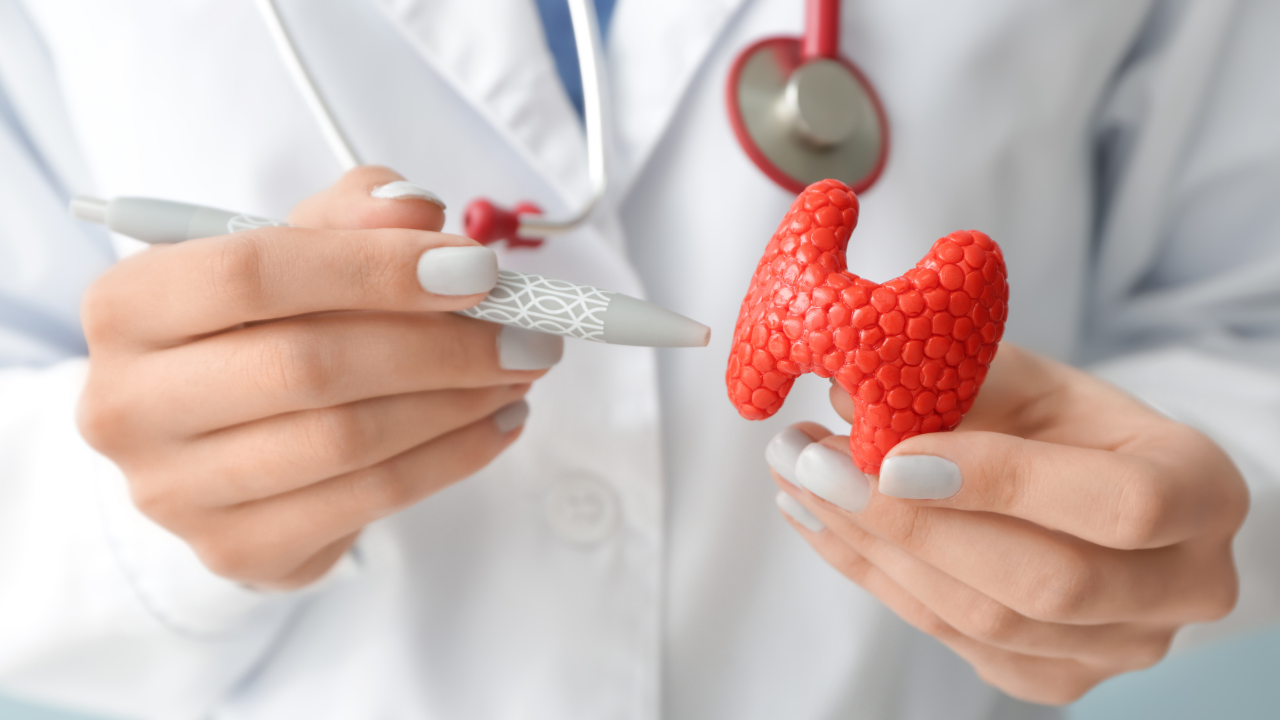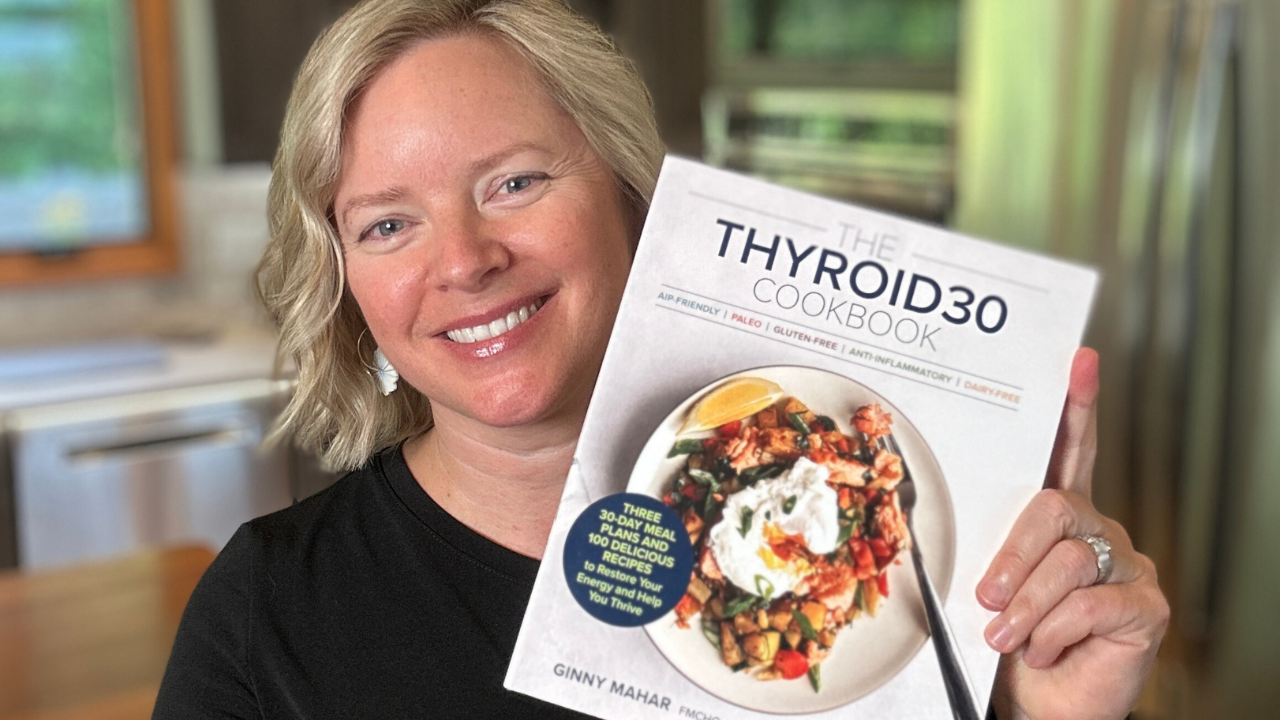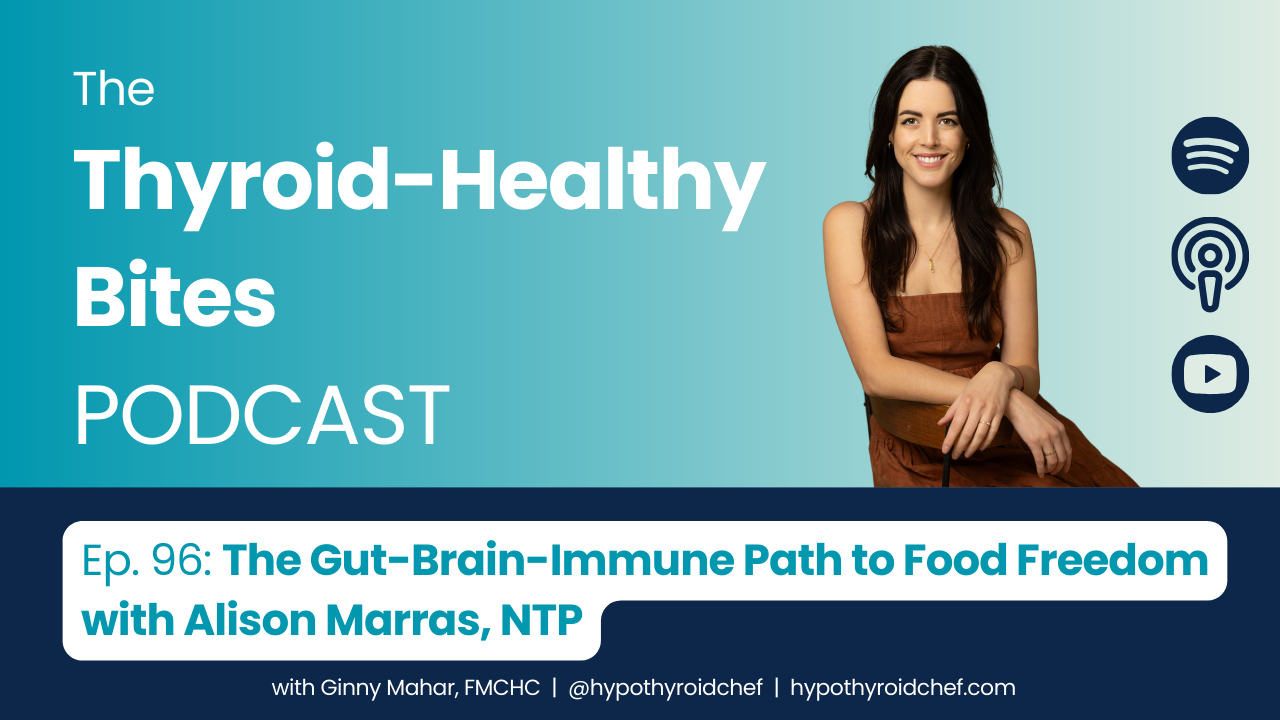Why You Should Get Tested for Hashimoto's if You Have Hypothyroidism

If you’ve been diagnosed with hypothyroidism, you may be taking your prescribed thyroid replacement medication, monitoring your TSH levels with your doctor’s help, and going about your life. But there’s a critical piece of information about your health that you may be missing.
Too many of us have gone years, unaware of this knowledge as our health gradually declined. Are you ready to know what it is?
In the United States, up to 95% of people with hypothyroidism have an autoimmune disease called Hashimoto’s. It's also incredibly common, affecting about 5% of people in the U.S., according to The Cleveland Clinic.
That means that if you've been diagnosed with hypothyroidism and you live in the U.S., it’s almost certain that you also have Hashimoto’s. In this blog post and episode of Thyroid-healthy Bites, we're going to take a closer look at what that means for you.
Full disclosure: Some of the links in this post may be affiliate links. As an Amazon Associate, I earn from qualifying purchases. Purchasing a product using one of these links will support my work at no additional cost to you. Please know that I only recommend products I wholeheartedly stand by.
We'll Discuss:
- The difference between hypothyroidism and Hashimoto's
- Why many doctors don't test for Hashimoto's
- Why your Hashimoto's diagnosis matters
- My Hashimoto's diagnosis story
- What your next steps and options are if you're ready to get tested
Disclaimer: This information is for educational and inspirational purposes only. Always consult with your doctor or other qualified healthcare providers before making changes to your diet, health care, or exercise regimen.
Show Notes:
- Download my FREE Thyroid-healthy Grocery Guide
- Paloma's Complete At-home Thyroid Test Kit (30% OFF CODE: HYPOTHYROIDCHEF)
- How to Find a Good Thyroid Doctor
Podcast Links:
- Subscribe on iTunes
- Follow on Spotify
- Subscribe on YouTube
- Subscribe on Google Podcasts
- Subscribe on Amazon Music
- Listen on Stitcher
- Listen on the podcast page
Hypothyroidism vs Hashimoto’s: What’s the Difference?
Hypothyroidism is the condition of having an underactive thyroid. Hashimoto’s Thyroiditis is an autoimmune thyroid disease, in which the immune system attacks and destroys thyroid tissue. Hashimoto's is the #1 cause of hypothyroidism in the United States and other developed countries including Canada.
Hypothyroidism is detected by testing your TSH, or thyroid stimulating hormone. The higher the number, the harder your body is working to try and stimulate the thyroid to make thyroid hormone. It's as if TSH is saying, "Hey, wake up, thyroid! You need to get to work!"
Thyroid hormone is essential because it controls your metabolism, which affects virtually every system in the body. A TSH above 5.0 mIU/L, indicates hypothyroidism according to conventional medicine.
Hashimoto's and hypothyroidism are often synonymous but aren't the same thing. Hashimoto's Disease, also known as autoimmune thyroiditis, is usually indicated by the presence of anti-thyroid antibodies; TPO antibodies are present in approx. 90% of cases, and Tg antibodies are present in approx. 50% of cases.
This part can be a bit confusing, but a person can have elevated antibodies (indicating Hashimoto's), without having an elevated TSH or symptoms of hypothyroidism. Also, approximately 5% of patients can have Hashimoto's without having elevated anti-thyroid antibodies. In these cases, Hashimoto's may be detected by ultrasound.
Hashimoto’s is most commonly associated with hypothyroidism but can also cause the body to yo-yo between hypo- and hyper- thyroidism.
With Hashimoto’s, the body’s immune system attacks and destroys its own thyroid tissue. Sometimes, that attack on the thyroid gland can release an excess of thyroid hormone into the body, leading to hyperthyroid symptoms.
Your doctor might not tell you any of this or even test you for Hashimoto’s because it doesn’t change the standard treatment protocol of synthetic thyroid hormone and monitoring TSH only.
The Takeaway: The vast majority (over 90%) of us in developed countries who have hypothyroidism, in fact, have Hashimoto's. This does not mean ALL hypothyroid patients have Hashimoto's. Also, it's possible to have Hashimoto's, without having hypothyroidism. Still, if you've been diagnosed with hypothyroidism, it's important to ask your doctor to test you for Hashimoto's as well.

Why Many Doctors Don't Test for Hashimoto's
You may be thinking, "I don't have Hashimoto's. I just have hypothyroidism. Surely, my doctor would have tested me for Hashimoto's if they suspected I had it!"
Think again.
I once believed that, too, but as patients in the conventional medical system, that's often not the case. The conventional standard of care and treatment for hypothyroidism is daily synthetic thyroid hormone (like levothyroxine) and monitoring with TSH testing only. Many doctors don't feel it's necessary to test for Hashimoto's because it doesn't change that treatment plan. Hashimoto's or not, many doctors still insist on testing and normalizing TSH only with the use of levothyroxine.
This standard has left many Thyroid Thrivers in the dark about what's really going on in their body. If we have an autoimmune disease, shouldn't we be made aware of that?
Also, there are other thyroid tests that can make a big difference in assessing how well our medication is working for us and, ultimately, in our quality of life.
TSH testing alone does not explain why TSH is off. Nor does it show us how our bodies are utilizing or converting our T4-only medications into the active form of thyroid hormone (T3).
Functional, holistic, and/or integrative doctors often take a more comprehensive approach to treatment, which is why so many of us find it necessary to find a new doctor willing to go beyond the basic standard of care. For many of us, this has been required in order to find the right medication at the right dosage and to more fully understand and be advised on what it means to have an autoimmune disease.
Further Reading: How to Find a Good Thyroid Doctor
As patients, we can always request the antibodies tests to check for Hashimoto's. Some doctors will, and some doctors refuse to run them. If this happens to you, I encourage you to either find a doctor who will order the tests for you, order the tests yourself, or explore at-home thyroid test kits that can provide these answers.
There are other causes of hypothyroidism besides Hashimoto’s, like iodine imbalance, surgery, or radiation. Knowing the root cause is crucial. In the words of thyroid expert Mary Shomon, “Understanding the ‘why’ behind a diagnosis of hypothyroidism is critical to moving forward with a treatment plan.”
Why Your Hashimoto's Diagnosis Matters
Over time, Hashimoto’s can lead to the destruction of the thyroid gland, the formation of thyroid nodules, thyroid cancer, and a host of other health issues. With Hashimoto’s, you are also at an increased risk of other autoimmune diseases.
While many of us are able to live relatively normal lives with Hashimoto's, other autoimmune diseases can have a much bigger impact on our quality of life. Diseases like Type 1 Diabetes, MS, ulcerative colitis, lupus, Crohn's, and rheumatoid arthritis are just a few others from the long list of autoimmune diseases.
Studies have shown that up to 25% of us with one autoimmune disease will develop additional autoimmune diseases. Multiple autoimmune syndrome is a condition in which three autoimmune diseases are present and is more common in those with a history of autoimmune disease.
I don't share this to scare you but to empower you. How can we be proactive or take preventive measures if we don't even know what's really going on in our bodies? Being left in the dark cost me four long years of feeling sick and tired, slogging through every day. Sadly, because I was diagnosed post-partum, these were the first four years of my son's life. I don't want you to have to suffer needlessly, like I did.
Even though it can feel a bit scary, finding out that you have an autoimmune disease opens up a world of powerful information that can make a big difference to your health.
One of the key facts to know about autoimmune disease, according to Terry Wahls, M.D., whom I interviewed in 2019, is that "Autoimmunity has a significant diet and lifestyle component, with a significant portion of your risk coming from how you live, what you eat, and your environment.”
Dr. Wahls recommends a nutrient-dense diet, reducing toxic exposure, staying active, managing stress, and finding community support as some of the most potent preventatives you can adopt. These are the principles she’s used to beat progressive multiple sclerosis, which happens to be another autoimmune disease.
These are the same principles taught by the Institute for Functional Medicine and in my Functional Medicine Health Coach Certification training. They are the principles I live by, share, and create resources for, and the same principles that so many other Thyroid Thrivers use to stay on the sunny side of 'Health Street.'
These diet and lifestyle changes are not only empowering, but they can help us reduce symptoms, feel our best, improve our quality of life, and ultimately, safeguard our health.

My Hashimoto's Diagnosis Story
I went four years from my original diagnosis of hypothyroidism until I learned what I actually had was Hashimoto's. I remember hearing that word — Hashimoto’s — and thinking, I don’t have that. I just have hypothyroidism. My doctor would have tested me for that...right?
During those four years, my health was on a steady decline. I was tired every day from the moment I woke up. I was battling multiple infections, sick for months at a time, and on round after round of antibiotics. I was dealing with repeated bouts of laryngitis that took my voice away for three weeks at a time. Strep throat became tonsilitis, and then double ear infections, in spite of antibiotics.
This was not normal for me. I used to be a person who rarely got sick. Now, my body couldn't even seem to recover from the common cold.
I struggled with several common hypothyroidism symptoms like hair loss, weight gain, joint pain, chronic hoarseness, and a serious case of the blahs. My brain fog was sometimes so bad that I wasn't sure if I should be driving a car.
My work as a chef, food writer, and cooking instructor became compromised. I began to notice that things like gluten, grains, dairy, and sugar made me feel worse, which made teaching traditional cooking classes difficult. Plus, I was so sick so often that I had to cancel some of my classes.
I was noticing correlations between my diet and my symptoms, even though my doctor assured me each year at my check-ups that diet wouldn’t make a difference for my thyroid condition. Her opinion was that because I was on levothyroxine and my TSH was normal, my health struggles were probably just a result of my age. (I was in my late thirties at the time.)
During those four long years, I was struggling to be the mother I wanted to be, with so much illness and such constant low energy.
Eventually, I hit rock bottom. I remember driving myself to the ER with a relentless headache that had gone on for weeks, crying tears of frustration and fear. Honestly, I had started to wonder, Am I going crazy? Is this really just all in my head? Is this just how I'm supposed to feel at 39? Or am I actually dying?
A handful of my cooking class students changed everything. While teaching a class on whole-food nutrition recipes, I mentioned that I had to be very choosy about which classes to teach because I had hypothyroidism and noticed correlations between what I ate and how I felt.
A handful of women came up to me after class. Each of them had been through their own hypothyroid journey. One of them reported that she and her sister had both reversed their diagnosis and gotten off meds by eliminating wheat (and only wheat) in their diet. The others had their own experiences, eliminating various foods, trying different types of medication, and feeling better. I thanked them, jotted down their book recommendations, and drove home thinking, My God, how did it take me so long to learn this? How could my doctor have told me none of this mattered?!
My life (and career) would never be the same. The lightbulb had finally turned on, and it was other Thyroid Thrivers who did that for me. I'll never forget that...and knowing the difference that even one fellow Thriver can make is a big part of what drives me today.
That night, I immediately ordered their book recommendations and began to educate myself-- a process that has continued for me to this day. But it was that fateful lightbulb moment when I learned that I needed not just TSH testing but a full panel of thyroid tests, including testing for Hashimoto’s.
On the Podcast: Rethinking Hypothyroidism Treatment with Dr. Antonio C. Bianco
A complete thyroid panel includes:
- Thyroid Stimulating Hormone (TSH)
- Free Thyroxine (Free T4)
- Free Triiodothyronine (Free T3)
- Thyroid Peroxidase (TPO) Antibodies
(Note: Some practitioners also recommend Reverse T3 and Tg antibodies.)
The first three tests would tell me if I was on the right amount of thyroid medication and if that medication was being well-utilized by my body. The TPO antibodies test, if elevated above 35 IU/mL, would indicate positive thyroid antibodies, or in other words, Hashimoto's.
I immediately called my doctor’s office to request the tests, and thankfully, they agreed.
“This is like déjà vu,” the nurse said as I rattled off the list of tests. “I just did all this for someone else.”
A week later, she called with the results, informing me that my antibodies were elevated.
“So, I have Hashimoto’s?” I asked.
“Yes,” she said. “It's what the doctor expected, but it doesn't really change anything. Just continue taking your levothyroxine.”
Even though the doctor expected that I had Hashimoto’s, she hadn’t tested me because it made no difference to her standard treatment: levothyroxine and TSH testing only.
Although a Hashimoto’s diagnosis may not have changed her treatment plan, it certainly changed mine.
Knowing I had Hashimoto’s was a key to a whole new world of options to improve my health, and I pursued them with gusto. The first thing I did was find a new doctor and then change my diet and lifestyle. The best option in my area was a naturopath who helped uncover and address underlying issues, like imbalances in my intestinal bacteria (gut dysbiosis) and nutrient imbalances. Her willingness to do the detective work, listen to me, and validate that what I was going through was NOT all in my head changed my life, and I continue to work with her to this day.
Within a few months, I lowered my thyroid antibodies by more than half, and they continue to decrease. But best of all, I got my energy back. After years of feeling tired every day, I now have my life, energy, and vitality back, thanks to getting my antibodies in check.
Further Reading: How I Reclaimed My Health from Hashimoto's
According to thyroid health experts like Dr. Izabella Wentz, it also means that I may have lowered my risk for additional autoimmune conditions or Multiple Autoimmune Syndrome.
The changes I've made have kept me relatively healthy and happy, and I am able to once again live my life and be the person, wife, and mother I want to be. I am pursuing my dreams and learning new things, and I feel vibrant and energized most of the time. I also haven't needed one round of antibiotics since I made this shift in 2015 (unless you count the ones I had to take for shoulder surgery).
I have once again become a person who can say, "I rarely get sick."
Your Next Steps
The good news is that finding out if you have Hashimoto's is pretty easy in most cases.
If you’ve been diagnosed with hypothyroidism, be sure to request that your doctor also test you for thyroid antibodies:
- Thyroid Peroxidase Antibodies (TPOAb)
You can request them as part of a full thyroid panel, which also includes:
- TSH
- free T3
- free T4
- And sometimes, Tg antibodies and Reverse T3
If your doctor refuses to test you for Hashimoto's, consider finding a new doctor or ordering the tests yourself through a company like Paloma Health. Their Complete At-home Thyroid Test Kit includes all of these tests. They also have a growing number of states with insurance-covered doctors (via telemedicine) who specialize in treating thyroid patients.
Get $30 OFF Paloma's Complete At-Home Thyroid Test Kit with the code: HYPOCHEF.
Also, keep in mind that in addition to TPO antibodies testing, Tg antibodies testing and/or ultrasound testing are other options you can talk to your doctor about.
In Conclusion
If you've been diagnosed with hypothyroidism but are unsure whether or not you have (or have been tested for) Hashimoto's, it's time to find out. Getting a complete and accurate thyroid diagnosis is essential to your healing journey. Hopefully, someday, Hashimoto's testing will be standard practice for all doctors. Until then, don't hesitate to advocate for your needs as a patient. Ask for the answers (and tests) you deserve, and keep searching until you find a doctor willing to help you solve your health puzzle.
Happy thriving, and enjoy the episode!

Sources:
- https://www.thyroid.org/hashimotos-thyroiditis/
- https://www.thyroid.org/patient-thyroid-information/ct-for-patients/vol-7-issue-9/vol-7-issue-9-p-10-11/
- https://www.verywell.com/hashimotos-vs-hypothyroidism-whats-the-difference-3231721
- https://my.clevelandclinic.org/health/diseases/17665-hashimotos-disease
- https://thyroidpharmacist.com/articles/do-you-have-hypothyroidism-or-hashimotos-or-both/
- https://www.goodrx.com/conditions/hypothyroidism/hashimotos-disease
- https://www.verywellhealth.com/hypothyroidism-causes-risk-factors-3231721
- https://www.mayoclinic.org/diseases-conditions/hashimotos-disease/diagnosis-treatment/drc-20351860
- https://my.clevelandclinic.org/health/articles/22391-thyroid-hormone
- https://www.uclahealth.org/endocrine-center/normal-thyroid-hormone-levels
- https://thyroidpharmacist.com/articles/the-many-faces-of-hashimotos/
- https://www.mayoclinic.org/diseases-conditions/hypothyroidism/diagnosis-treatment/drc-20350289
- https://medlineplus.gov/lab-tests/tsh-thyroid-stimulating-hormone-test/
- https://www.ncbi.nlm.nih.gov/pmc/articles/PMC3150011/
Subscribe to my free newsletter for fresh recipes & lifestyle tips, delivered weekly, and receive a free gift!
By submitting this form, you agree to receive ongoing updates from Hypothyroid Chef











